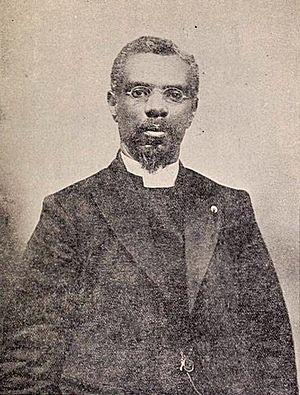William Henry Heard facts for kids
Quick facts for kids
William H. Heard
|
|
|---|---|
 |
|
| Born | June 25, 1850 Elbert County, Georgia, U.S.
|
| Died | September 12, 1937 (aged 87) |
| Occupation | Minister, U.S. Ambassador to Liberia |
| Political party | Republican |
| Spouse(s) |
Josephine Delphine Henderson
(m. 1882) |
William Henry Heard (born June 25, 1850 – died September 12, 1937) was an important American leader. He was a minister in the African Methodist Episcopal Church, which was one of the first independent churches for Black Americans. He also served his country as the United States Ambassador to Liberia from 1895 to 1898. His life story shows how he overcame many challenges to achieve great things.
Contents
Early Life and Education
William Heard was born into slavery around 1850 in Elbert County, Georgia. Being born into slavery meant he was not free. He was treated as property, not as a person. His father, George W. Heard, was a skilled worker. He worked as a blacksmith, wheelwright, and carpenter. William's mother, Parthenia Galloway, was also enslaved. She was good at plowing and caring for her children.
Because they were enslaved, William's parents could not legally marry. They also lived on different farms, about three miles apart. His father was allowed to visit his family only twice a week.
William experienced hardship from a young age. He was sold twice with his mother and siblings. When he was nine, his mother and older sister died from typhoid fever. At age ten, he was forced to work as a plow boy on a farm.
Seeking Education After Slavery
When William was about fifteen, the American Civil War was ending. He knew slavery might soon be over. He ran away and went to live with his father. His father had a wheelwright shop in Elberton.
During slavery, it was against the law for enslaved people to learn to read or write. But William was determined to learn. He went to Sunday school and memorized many parts of the Bible. After slavery ended, he paid a white schoolboy ten cents for each lesson to teach him to read. He also worked for a farmer named William H. Heard, who helped him learn more. William later took this farmer's last name.
William was always looking for ways to learn. Eventually, a school opened in Elberton for freed slaves and their children. He attended this school and worked hard. He even earned a teaching qualification. He then went to the University of South Carolina. However, in 1877, new laws prevented Black students from attending the university.
Career and Public Service
In the 1870s, during a time called Reconstruction, William Heard became involved in politics. He was elected to the state legislature in South Carolina. He served in the South Carolina Senate from 1876 to 1877. He represented Abbeville County as a Republican. However, he was removed from office when another political party gained power. Because of his political work, he found it hard to get a job as a teacher in South Carolina. He later finished his education in Philadelphia.
In 1878, William joined the African Methodist Episcopal Church (AME Church). This church was very important because it was the first independent Black church in the United States. He quickly became a leader in the church. He was ordained as an elder in 1883 and became a bishop in 1908. He was not just a minister; he also helped organize events and raise money for the church.
William Heard believed strongly in equal rights for all people. In 1887, he took legal action against the Georgia Railroad Company. The company was charging Black passengers full price but giving them worse seating. He fought for fair treatment for everyone.
Ambassador to Liberia
With the help of Bishop Henry McNeal Turner, William Heard received an important diplomatic job. On February 21, 1895, President Grover Cleveland appointed him as the U.S. Minister Resident and Consul General to Liberia. Liberia is a country in West Africa.
While in Liberia, William Heard also led the AME Church's work there. He helped build the first AME church in the capital city, Monrovia. It was called the Eliza Turner Memorial Chapel. Before returning to America, he traveled through Europe. He noticed that racial prejudice was less common in France and seemed not to exist in Switzerland.
William Heard remained active in his church throughout his life. He attended a major church conference in Scotland just a month before he passed away.
Marriage and Family
William Heard married Josephine Delphine Henderson in 1882. She was from Salisbury, North Carolina.
Death
William H. Heard passed away in Philadelphia on September 12, 1937. His death was reported in many newspapers in both the United States and Britain.
Works
- Africa: Verse and Song Atlanta, Ga. : Union Publishing Col., [ca. 1900?]
- The Bright Side of African Life A.M.E. Publishing Co, Philadelphia, 1898
- From slavery to the bishopric in the A.M.E. Church New York : Arno Press, 1969.
- The American Negro's Opportunities in Africa (essay) [1]
Images for kids
 | Laphonza Butler |
 | Daisy Bates |
 | Elizabeth Piper Ensley |


